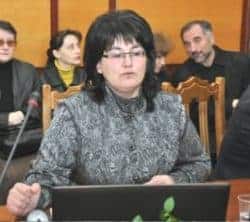
Inga Druţă is doctor habilitatus, assistant professor, researcher, terminologist, specialised translator, book reviewer, and Director of the Terminology Centre of the Institute of Philology of the Academy of Sciences of Moldova. In 1999, Inga Druţă defended her PhD thesis on the topic of ‘The neologism in the stylistic structure of the current Romanian language” and later, in 2014 she was awarded the title of Doctor habilitatus after defending her thesis on the topic of ‘Dynamics of Romanian terminology under the impact of translation”. Ms Druță authored more than 70 scientific works, including three monographs and three dictionaries. She is also member of the examination commission for sworn translators of the Ministry of Justice of the Republic of Moldova. Without no doubt, Ms Druță plays a major role in the development and promotion of terminology in Moldova, and is an outstanding custodian of the Romanian language spoken in the Republic of Moldova.
1. Could you give us some details about the creation of the National Centre for Terminology in Moldova: when was it established, who came up with the initiative, what are the Centre’s objectives, how many employees do you have, what partnerships (with terminology centres abroad, organisations etc.) do you have?
The Terminology Centre was created in 1989, within the Academy of Sciences of Moldova, at the initiative and with the efforts of researchers Constantin Tănase and Valeriu Culev, as an institution for research into and the implementation of terminologies in the administrative, economic, social institutions, etc. of the Republic of Moldova. The Centre’s main priority is to promote the use of the Romanian language in all spheres of activity. Before 1989, when the law on the status of the Romanian language as the official language and the return to the Latin alphabet was adopted, the government exclusively used the Russian language. This is why the newly created institution had an exceptional historic mission to fulfil, that of translating and adapting standards, forms, instructions, the names of products, the names of enterprises, institutions and commercial entities, advertising texts etc., from Russian into Romanian, for different beneficiaries. At that time, the Centre had 25 employees who worked with enthusiasm, dedication and, sometimes, overtime. The core of the institution was made up of former editors of the editorial board of an encyclopaedia produced by a prestigious publishing house of the era, who had both specialist and linguistic knowledge, holding degrees in engineering, biology, law etc. From the very beginning, Uniunea Latină[1] provided considerable support, including grants for logistics equipment. We succeeded in establishing efficient partnerships with the Pan-Latin network Realiter, with the ‘Termrom-București’ NGO, and with terminologists and specialists in computational linguistics from Bucharest, Iaşi, Cluj-Napoca and Timişoara. Together with a team from ‘Petru Maior’ University of Tărgu-Mureş (Romania) coordinated by associate professor Doina Butiurcă, we successfully compiled a valuable multilingual dictionary Dicționar de termeni economici (Dictionary of Economic Terms) in two volumes (Bucharest, Editura Universitară, 2013-2014).
2. What services are provided by the National Centre for Terminology in Moldova?
In order to fulfil its mission, the National Centre for Terminology devises and promotes projects aimed at creating useful working tools (terminological dictionaries, databases etc.) designed for specialists and the public; drafts, corrects and approves the names of institutions, enterprises, companies etc., advertising texts, the names of products etc.; provides linguistic and terminological consulting services to central and local authorities, enterprises, institutions, associations and natural persons; translates and revises a variety of specialised texts; provides terminological expertise on request; and promotes the rules of Romanian literary language and sectoral terminologies during conferences, seminars etc. organised by ministries, enterprises and various institutions, and in the mass media. On the Centre’s website (www.cnt.md), you can find the ‘Term of the day’ section, which presents new terms or terms that are used incorrectly in a brief and accessible manner, including an explanation of the error and the correct form. Moreover, from 1989 until today, the Centre has been offering terminological and linguistic consultations free of charge over the phone during working hours. Many people know our contact number and call us with different questions. We are contacted by translators and office clerks, in particular, as well as by pupils who ask for our help with their homework, or for explanations of certain words or synonyms.

3. What does it mean to be a terminologist in the Republic of Moldova?
In general, being a terminologist means permanently keeping up with the news, keeping track of what is happening in the world, in every field, because new phenomena and events generate new terms (for example, bitcoin, Brexit, troll etc.). Secondly, you have to be well versed in the field of translation and terminology, to follow the most important publications in the field, such as electronic dictionaries and databases, so that you will know where to look for a term. Moreover, you have to have a perfect knowledge of the rules of your native language, the rules of word formation and, the most important, Greek and Latin roots because a terminologist must have the relevant skills to analyse a term and to assess whether it has been correctly formed, according to the rules and principles of a certain language. In the Republic of Moldova, a terminologist must know two or three languages, especially French and English (the source word-stocks for the Romanian language), and be proficient in Russian, since he or she will have to translate/adapt terms from Russian into Romanian and vice versa. He or she should also be creative to be able to help the beneficiaries find a correct name for their companies, which resonates with them, and will be involved in the localisation of advertising, whereby the language of advertising is not translated as a specialised text, but as a literary text aimed at achieving a persuasive effect.
4. Why do you think terminology is important in Moldova?
Terminology is the most dynamic component of a language. The Romanian language experienced some hard times in the Republic of Moldova up until 1989. The government – authorities, enterprises and institutions – used the Russian language, while the Romanian language was spoken in schools, on a partial basis in universities, and for the rest – banished to the kitchen. The Soviet power in the USSR insinuated that national languages spoken in the ‘sister’ republics were poor and did not possess any terminology, and it therefore imposed the Russian language by any means. On 31 August 1989, when the Romanian language acquired the status of official language in the Republic of Moldova, a period of making up for lost time commenced. The Romanian language began to gain ground everywhere: in ministries and enterprises, post offices and business entities, town halls and cultural institutions, etc. People learned to speak their native language well and correctly, by discovering the coherence and harmony of terminologies in different areas, and the National Centre for Terminology played a significant role, as, through the thousands of forms, instructions, labels, etc. that had been translated and adapted from Russian into Romanian, many fundamental and indispensable terms for a modern national language had come into being.
5. What are the issues, if any, between the terminology used in Romania and the Republic of Moldova. Is it a unified or separate terminology? (Note: Romanian is the language spoken in both countries)
In the 1990s, some concepts were renamed using different terms in the Republic of Moldova due to the massive quantity of translations from the Russian language, when some calques were created. Over time, they were corrected and went out of use. Today, we can confirm that the terminology used in Romania and the Republic of Moldova is unified.
6. What are the most significant achievements of the National Centre for Terminology in Moldova?
An important work is the Classification of professions, which was translated from Russian in 1994‑1995 at the request of the Minister of Labour. This classification is still in current use, with the relevant additions and modifications. Another significant achievement is the series of small dictionaries of professions (Russian-Romanian): Dictionary of Forestry (2000), Dictionary of Hairdressing (2000), Small Automotive Dictionary (2002), Textile Worker’s Dictionary (2003), Railwayman’s Dictionary (2004), Taxi Driver’s Guide (2005), Names of Non-Food Products (2005), Civil Servant’s Guide (2004, published in eight editions, the most recent from 2012), Concise Dictionary for Construction (2010), etc. Over time, the terms collected by the Centre for Terminology’s researchers from different translations had been stored in two electronic collections: GesTe (a terminological database with terms in Romanian, Russian, French and English, and their definitions in Romanian http://old.cnt.md/geste/index.php?action=search) and Liderra, an interactive electronic Russian-Romanian/Romanian-Russian and English-Romanian/Romanian-English dictionary (www.liderra.com). Both works are available to the public and free of charge. I would like to thank Ms Dorina Chis, associate professor at Tibiscus University, Timişoara (Romania), for her kindness in providing the software for the GesTe database, which she created together with her son, Valeriu Chis, who is a computer expert, after the invitation from the Latin Union, for which the organisation provided a grant. It is an extraordinary example of collaboration for terminologists in the Republic of Moldova and Romania, because the researchers of the Terminology Centre in Chişinău have the opportunity to store terms in the respective applications.
7. The government’s decision, on 18 February 2002, about the National Centre for Terminology states under Article 9 that one of the Centre’s tasks is to attract students from higher education institutions into the fields of terminology and specialised translation and to guide them in their activities. Can you describe how the Centre carries out this task and the results obtained?
It is true that for over 15 years, around 10 to 15 students have conducted their internships at our Centre each year. The students mainly come from the Faculty of Foreign Languages and Literatures of Moldova State University, the Faculty of Letters of the Free International University of Moldova and the Faculty of Social and Human Sciences of the Academy of Sciences of Moldova. These institutions teach courses on terminology, which is why students are curious to find out more about the practical secrets of this profession. At our Centre, they acquire experience in the field of specialised translations, learn to create term records, become familiar with the GesTe database, as well as with our paper and electronic dictionaries, and even make new term entries. Moreover, we organise a terminology competition for students every year.
8. What are the difficulties encountered by the Centre for Terminology in its activities?
In the first few years of its activity, the difficulties were mainly of a practical nature. At the moment, the Internet is very helpful in our activities compared to the 1990s when our only sources of information were paper dictionaries and the numerous standards, forms, manuals and various specialised books that we brought from Romania on each occasion. Back then, the authorities provided every possible support in promoting terminology and the rules of the Romanian language. We had a State Department of Languages, which exercised scrutiny and monitored the observance of language legislation in all sectors, both state and private. Unfortunately, its work was stopped in 1994 and since then, nobody has been in charge of language issues in the country. The Centre for Terminology is a consultative institution, but with no powers of scrutiny, and only the public authorities show a sporadic interest in these issues (especially issues related to advertising). It seems that the authorities have become less sensitive to the issues pertaining to the official language, even resorting to reducing our number of posts from 25 to 15, and, in 2007, to seven. In 2006, the National Centre for Terminology was reformed and merged with the Philology Institute of the Academy of Sciences of Moldova, losing both the title ‘national’ and the status of legal person. Not to mention the more than insufficient financing of research in recent years. At present, our initiatives are no longer supported by the authorities, except on very rare occasions.
9. Could you please tell us about the Centre for Terminology’s ongoing projects?
Our current project is called Portal de resurse lingvistice pentru limba română[2] (2015-2018). We decided that a greater number of resources – GesTe database, electronic dictionaries (www.liderra.com), guides for correct language use, studies on language etc. should be stored on a single interactive platform for beneficiaries.
Today, international research in the field of linguistics has reached a sufficient level of maturity to allow synergy in the efforts made by linguists, terminologists and computer experts to approach some inter-disciplinary projects aimed at the automatic processing of natural languages, where Romanian has begun to make its way. Depending on the available linguistic resources, their volume and quality, and the compliance of codification with the international recommendations and standards, we can talk about the level of technologisation of a natural language. The degree of technologisation of a natural language is directly connected to the status of language of electronic use. The concept of language of electronic use has profound cultural, social and economic implications, including the right of every citizen to have access to the knowledge, information and services provided by cyberspace (or the information market) in his or her native language. The proposed portal of linguistic resources for the Romanian language will be aligned to other platforms of the same kind, developed for other languages (http://www.sil.org/linguistics/linguistics-resources, http://www.termcat.cat, http://www.culture.fr/Ressources/FranceTerme, etc.), or for Romanian (www.archeus.ro, dexonline.ro, digibuc.ro etc.).
10. What are the Centre for Terminology’s prospects for the future?
From the very beginning, the institution has functioned for the benefit of citizens. We want to continue this work to cover the exacting demands of our beneficiaries. The next planned project will comprise a database of names and surnames. During Soviet times, many names and surnames of our citizens were distorted, underwent russification and were used in incorrect and unnatural forms. People want to have their names used correctly and properly. Our product, which will be available online and free of charge, will help them to find the literary forms of their names or surnames, the popular acceptable versions and the incorrect, distorted ones. In this way, we can help ordinary people and the civil servants of the Registry Office to correct names and surnames. Afterwards, we plan to draw up guides to correct electronic communication, and perhaps also for online games, which may help children and adolescents who do not speak Romanian to learn the language more easily. As far as the terminological aspects are concerned, we will continue our collaboration with the Institute of Standardisation of Moldova, as well as with various ministries and agencies, in order to unify and promote correct and harmonious terminologies.
[1] The Latin Union is a defunct international organisation of nations that used Romance languages, and had the aim of protecting, disseminating and promoting the common cultural heritage of Latin peoples and unifying identities of the Latin, and Latin-influenced, world. It was created in 1954 in Madrid, Spain.
[2] In English: Portal of linguistic resources for the Romanian language.

Interviewer: Alina Busila
Alina is a researcher, lawyer-linguist and university lecturer at Moldova State University. She has published approximately 10 articles on topics related to legal translation and legal terminology. From 2017, she has been a member of International Language and Law Association (ILLA) and PhD junior researchers panel of ILLA.

